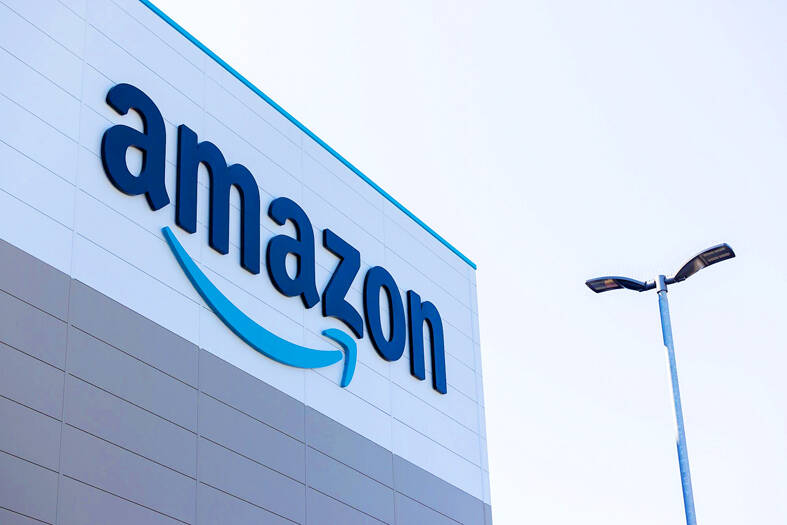Amazon.com Inc’s cloud-computing unit on Tuesday announced updated versions of its in-house computer chips while also forging closer ties with Nvidia Corp — dual efforts designed to ensure it can get enough supplies of crucial data-center processors.
New homegrown Graviton4 chips will have as much as 30 percent better performance than their predecessors, Amazon Web Services (AWS) said at its annual re:Invent conference in Las Vegas. Computers using the processors are to start coming online in the coming months.
The company also unveiled Trainium2, an updated version of a processor designed for artificial intelligence (AI) systems. It will begin powering new services starting next year, Amazon said. That chip provides an alternative to so-called AI accelerators sold by Nvidia — processors that have been vital to the build-out of AI services.

Photo: Bloomberg
However, Amazon also touted “an expansion of its partnership” with Nvidia, whose CEO, Jensen Huang (黃仁勳), joined AWS CEO Adam Selipsky on stage.
AWS is to be the first big user of an updated version of that company’s Grace Hopper Superchip, and it will be one of the data-center companies hosting Nvidia’s DGX Cloud service.
The new in-house chips are part of AWS’s push to maintain its lead over Microsoft Corp’s Azure and Alphabet Inc’s Google Cloud Platform. Earlier this month, Microsoft announced its own processors and AI accelerators. Like Amazon, it has pointed to the efficiency that they bring compared with buying off-the-shelf parts from traditional sellers such as Intel Corp.
AWS said that it has built more than 2 million Graviton processors since beginning the project about five years ago. All of the top 100 of its users of EC2 — AWS’ family of processing power for rent — have chosen to use Graviton-based computing, the company said.
“By focusing our chip designs on real workloads that matter to customers, we’re able to deliver the most advanced cloud infrastructure to them,” AWS vice president Dave Brown said. “Graviton4 marks the fourth generation we’ve delivered in just five years. And with the surge of interest in generative AI, Trainium2 will help customers train their machine learning models faster, at a lower cost and with better energy efficiency.”
Amazon faces a delicate balancing act. Although it is keen to tout the technological prowess of its new chips, the company also needs to maintain its relationship with Nvidia. Getting sufficient supply of Nvidia products has become a status symbol in the technology industry, with figures such as Larry Ellison and Elon Musk boasting about their ability to get the chips.
For now, Nvidia’s products are considered the industry’s best. Until Trainium or other alternatives can match their capabilities, companies like Amazon cannot afford to alienate Nvidia — and catching up will not be easy. Nvidia’s prized H100 chip is getting a more advanced update called H200 in the first half of next year, followed by a whole new design later in the year.
AWS will also operate a supercomputer based on Nvidia hardware. When not in use for internal research and development, the “supercluster” will be made available to other users as a service.

Semiconductor shares in China surged yesterday after Reuters reported the US had ordered chipmaking giant Taiwan Semiconductor Manufacturing Co (TSMC, 台積電) to halt shipments of advanced chips to Chinese customers, which investors believe could accelerate Beijing’s self-reliance efforts. TSMC yesterday started to suspend shipments of certain sophisticated chips to some Chinese clients after receiving a letter from the US Department of Commerce imposing export restrictions on those products, Reuters reported on Sunday, citing an unnamed source. The US imposed export restrictions on TSMC’s 7-nanometer or more advanced designs, Reuters reported. Investors figured that would encourage authorities to support China’s industry and bought shares

TECH WAR CONTINUES: The suspension of TSMC AI chips and GPUs would be a heavy blow to China’s chip designers and would affect its competitive edge Taiwan Semiconductor Manufacturing Co (TSMC, 台積電), the world’s biggest contract chipmaker, is reportedly to halt supply of artificial intelligence (AI) chips and graphics processing units (GPUs) made on 7-nanometer or more advanced process technologies from next week in order to comply with US Department of Commerce rules. TSMC has sent e-mails to its Chinese AI customers, informing them about the suspension starting on Monday, Chinese online news outlet Ijiwei.com (愛集微) reported yesterday. The US Department of Commerce has not formally unveiled further semiconductor measures against China yet. “TSMC does not comment on market rumors. TSMC is a law-abiding company and we are

FLEXIBLE: Taiwan can develop its own ground station equipment, and has highly competitive manufacturers and suppliers with diversified production, the MOEA said The Ministry of Economic Affairs (MOEA) yesterday disputed reports that suppliers to US-based Space Exploration Technologies Corp (SpaceX) had been asked to move production out of Taiwan. Reuters had reported on Tuesday last week that Elon Musk-owned SpaceX had asked their manufacturers to produce outside of Taiwan given geopolitical risks and that at least one Taiwanese supplier had been pushed to relocate production to Vietnam. SpaceX’s requests place a renewed focus on the contentious relationship Musk has had with Taiwan, especially after he said last year that Taiwan is an “integral part” of China, sparking sharp criticism from Taiwanese authorities. The ministry said

US President Joe Biden’s administration is racing to complete CHIPS and Science Act agreements with companies such as Intel Corp and Samsung Electronics Co, aiming to shore up one of its signature initiatives before US president-elect Donald Trump enters the White House. The US Department of Commerce has allocated more than 90 percent of the US$39 billion in grants under the act, a landmark law enacted in 2022 designed to rebuild the domestic chip industry. However, the agency has only announced one binding agreement so far. The next two months would prove critical for more than 20 companies still in the process